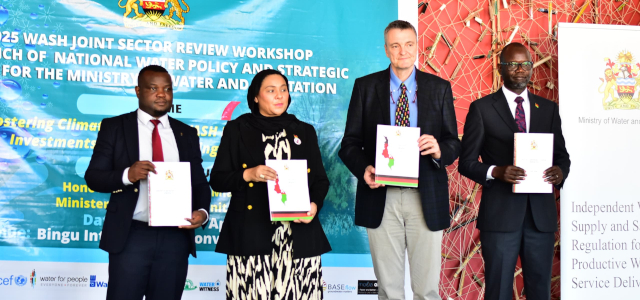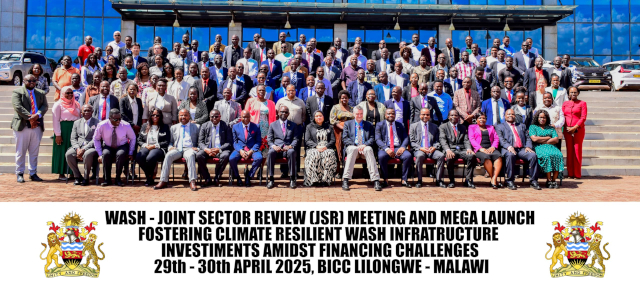These strategies, developed under the Global Water Leadership (GWL) Programme, target key barriers:
- Low investment in climate resilient water infrastructure and financing
- Lack of political will and leadership
- Weak coordination, policy enforcement, and regulation.

“The Malawi 2063 First Ten Year Implementation Plan (MIP-1) has specific priorities that our sector is expected to implement to achieve these goals. For example, we must construct multi purpose dams across the country to enhance water security. These dams will provide water not only for domestic use, but for agricultural purposes, fisheries, energy production, as well as tourism. In the face of climate change, where the frequencies and intensities of floods and droughts have increased, we aim to draw our climate resilience from these dams,” explained Hon. Abida Mia, Malawi’s Minister of Water (pictured left) during the launch.
The launch of the response strategies coincided with the unveiling of the revised National Water Policy and the Ministry’s Strategic Plan during Malawi’s annual Joint Sector Review Meeting on 29 April 2025, themed “Fostering Climate Resilient WASH Infrastructure Investments Amidst Financing Challenges.”
“We are excited to launch some of the most important documents for the sector, namely: The National Water Policy (2025), the Ministry’s Strategic Plan (2025 – 2030), Ministry’s Strategic Response Plans on Financing, Coordination and Advocacy (2025-2030 and also Ministry’s Website. This is a MEGA launch, and these products will provide the Ministry with extra ammunition to achieve its targets,” said Mr. Elias Chimulambe, Secretary for Water and Sanitation.

Hon. Abida Mia, Malawi’s Minister of Water and Sanitation (2nd from left) and water and development community officials showcase the various documents launched during the event
The development of these strategies was a collaborative effort involving multi-stakeholder task forces, including government officials, civil society, private sector, academia, and development partners. The process included regional consultations, national meetings, and validation workshops to ensure comprehensive stakeholder engagement.

“The launch of the Response Strategies (2025-2030) is a huge milestone as Malawi intensifies efforts to meet 2030 SDG 6 targets. We are happy to have supported the government to develop the strategies which will result in better-served and more climate-resilient communities,” said Mrs. Deborah Muheka, GWL Malawi Coordinator (pictured left).
The financial requirements for implementing the Malawi response strategies over five years are as follows:
- Water Resources and WASH Investment and Financing Strategic Response Plan: USD 4.2 million
- Advocacy Strategic Response Plan: USD 840,000
- Coordination, Policy Enforcement, and Regulation Strategic Response Plan: USD 3.9 million
These strategies aim to enhance climate resilience, improve service delivery, and align with Malawi's commitment to achieving Sustainable Development Goal 6 by 2030.
The GWL Programme in Malawi, implemented by GWP and UNICEF with funding from the UK's Foreign, Commonwealth & Development Office (FCDO), concluded in March 2024. It was part of a broader initiative to support emerging leadership to accelerate climate-resilient systematic changes at the scale and pace to help low- and middle-income countries build back better as they emerged from the COVID 19 pandemic.
The GWL Programme was implemented through a strategic collaboration between GWP, UNICEF, SWA, JMP, and WHO.
The programme was launched in April 2021, and implementation aimed to strengthen national support for water resource and services management, provide critical information and analysis to identify and resolve barriers, input into water and/or climate policies, and helped governments bolster their climate resilience. At the core of the GWL programme were government-validated Response Strategies for addressing the most critical barriers to climate-resilient water resources management and WASH.
It was implemented in seven African, Middle Eastern, and Asian countries; the Central African Republic in Central Africa; Rwanda and Uganda in Eastern Africa; Malawi and Tanzania in Southern Africa; Nepal in South Asia; and the State of Palestine in the Mediterranean.
